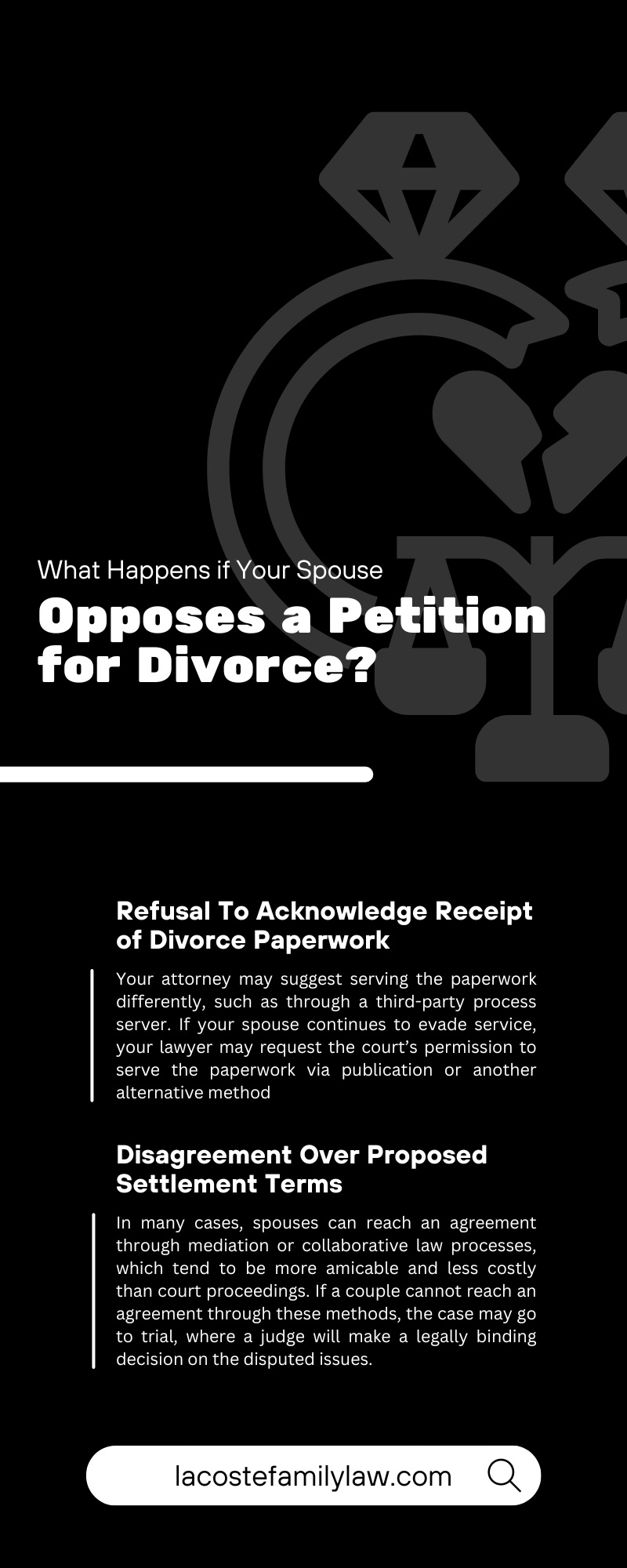
05 Feb What Happens if Your Spouse Opposes a Petition for Divorce?
Divorce is never easy, especially when emotions are running high and both parties are struggling to process the reality of their situation. One of the most challenging aspects of divorce can be when one spouse refuses to accept the dissolution of the relationship. You may be wondering what happens if your spouse opposes a petition for divorce. As family law experts, LaCoste Family Law understands the distress this can cause, and we are here to provide you with the information you need to navigate a contested divorce.
Understanding Contested and Uncontested Divorces
Before we delve deeper into what happens when a spouse opposes a divorce petition, it is important to understand the two main types of divorce: contested and uncontested.
Uncontested Divorce
An uncontested divorce occurs when both parties agree on all aspects of their separation, including child custody, property division, spousal support, and any other relevant matters. Uncontested divorces tend to be quicker, less expensive, and generally less stressful for all parties involved.
Contested Divorce
On the other hand, a contested divorce is when one or both spouses cannot agree on one or more issues related to the dissolution of their marriage. Common points of contention in contested divorces include property division, child custody, and spousal support. These disagreements often result in lengthy and costly court proceedings that can emotionally drain both parties.
What if Your Spouse Opposes the Divorce?
There are several ways a spouse might oppose a divorce petition. They might refuse to acknowledge receipt of the divorce paperwork or disagree with the terms of the proposed settlement.
Refusal To Acknowledge Receipt of Divorce Paperwork
If your spouse refuses to acknowledge receipt of the divorce paperwork, you should consult a lawyer to guide you through the next steps. Your attorney may suggest serving the paperwork differently, such as through a third-party process server. If your spouse continues to evade service, your lawyer may request the court’s permission to serve the paperwork via publication or another alternative method.
Disagreement Over Proposed Settlement Terms
Dealing with disagreements over proposed settlement terms is very standard. These disagreements can be complicated, and they require careful negotiation between two people who may have trouble seeing eye to eye. In many cases, spouses can reach an agreement through mediation or collaborative law processes, which tend to be more amicable and less costly than court proceedings. If a couple cannot reach an agreement through these methods, the case may go to trial, where a judge will make a legally binding decision on the disputed issues.
The Process of Contested Divorce
The process for a contested divorce can be a little complex, but understanding it can provide you with the guidance and knowledge you need to navigate this stage in your life. Here are the steps typically involved:
- Filing the petition for divorce: The spouse initiating the divorce process (the petitioner) files a petition with the court. This document states the grounds for divorce, the desired resolutions, and any additional information necessary for the case.
- Serving the papers: The petitioner must serve the papers to the other spouse (the respondent) to notify them of the divorce request and give them a time frame to respond to the petition.
- Response to the petition: The respondent can disagree with the petitioner’s requests by filing a response.
- Discovery: During this phase, both parties gather and exchange necessary information on issues such as asset distribution, child custody, and support. They may request documents, conduct depositions, or issue interrogatories.
- Settlement discussions: Often, the parties will attempt to reach a settlement to avoid a potentially costly, lengthy trial. Settlement negotiations can take place informally between the parties, through mediation, or even with the guidance of their attorneys.
- Trial: If the parties cannot reach an agreement, the case will go to trial. A judge will hear the arguments, review the evidence, and make a final decision on matters such as property division, child custody, and spousal support.
- Appeal (if applicable): If either party disagrees with the judge’s decision, they may appeal it to a higher court. This process can take additional time, and there is no guarantee that the appellate court will overturn the initial decision.
Tips for Navigating a Contested Divorce
When you are dealing with a contested divorce, seeking expert advice is important. Below are some tips to help you manage the process.
Hire an Experienced Attorney
A skilled family law attorney in the Tri-Cities of WA area will protect your rights throughout the process. They will advocate for your best interests, understand the nuances of your case, and help you effectively navigate the legal system. Consider LaCoste Family Law—we have the knowledge and experience in navigating contested divorce processes.
Focus on Communication
Open, clear, and respectful communication with your spouse, even during a contested divorce, can make the process smoother and increase the likelihood of reaching a settlement.
Maintain Emotional Control
Keeping your emotions in check during a contested divorce is crucial. The process can be emotionally charged, but staying focused on the goal—ending the marriage legally and fairly—is important. Avoid making decisions based on anger or resentment, as this could lead to long-term regret. Instead, aim to make decisions based on reason and sound advice from your attorney. This approach can aid in reducing conflict and potentially hasten the resolution of your case.
So what happens if your spouse opposes a petition for divorce? The answer largely depends on the specific circumstances and the reason for the opposition. Regardless of the reason, it is important to approach a contested divorce with patience, empathy, and a willingness to work toward a mutually beneficial resolution.
Seeking professional guidance and support is paramount in a contested divorce. Moving to a new stage in life requires patience, understanding, and support. At LaCoste Family Law, our experienced attorneys are here to help you through every step of your divorce journey. Contact us today to set up a consultation, and let us provide you with the skilled legal representation you deserve.


